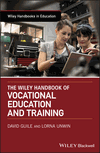Working with Historical, Cultural, and Economic Logics
The Case of Vocational Training in Argentina
Claudia Jacinto
National Council of Scientific Research at the Centro de Estudios Sociales
Search for more papers by this authorClaudia Jacinto
National Council of Scientific Research at the Centro de Estudios Sociales
Search for more papers by this authorDavid Guile
Search for more papers by this authorLorna Unwin
Search for more papers by this authorSummary
This chapter uses Raffe's (2008) concept of educational and employment logics to analyze the development of vocational training (VT) in Argentina. It provides a historical overview and then focuses on a process of redefinition of VT in the 2000s, which was a response to the demands and interests of social and economic stakeholders in the sociopolitical context of the period. The chapter argues that what has emerged does not comprise a harmonious, integrated system, but a complex amalgam of public and private actions responding to different demands and segments of the labor market. A new “social logic” has emerged.
References
- Bates, I., Hodkinson, P., Unwin, L., & Young, M. (1997). Towards a new research agenda for post-compulsory education and training. Research in Post-Compulsory Education, 2(3), 313–317.
- Cedefop. (2010). The benefits of vocational education and training (Cedefop Research Paper No. 10). Luxembourg: Publications Office.
- Cedefop. (2017). The changing nature and role of vocational education and training in Europe: Vol. 1. Conceptions of vocational education and training: An analytical framework (Cedefop Research Paper No. 63). Luxembourg: Publications Office.
- ECLAC (2013). Social panorama in Latin America. Author: Santiago de Chile, Chile.
- Ferraris, S., & Jacinto, C. (2018). Entre la educación post-escolar y la formación continua. El lugar de la formación para el trabajo en la inserción laboral de jóvenes en años recientes. In C. Jacinto (Ed.), El secundario vale. Saberes, certificados y títulos técnicos en la inserción laboral de jóvenes. Buenos Aires, Argentina: Miño y Dávila Editores.
- Filmus, D., Miranda, A., & Otero, A. (2004). La construcción de las trayectorias laborales entre los egresados de la escuela secundaria. In C. Jacinto (Ed.), Educar para qué trabajo (pp. 201–222). RedEtis/La crujía: Buenos Aires, Argentina.
- Gallart, M. A. (2003). La formación para el trabajo en la Argentina: situación actual y perspectivas para el futuro. CEPAL/GTZ: Santiago de Chile, Chile.
- Iannelli, C., & Raffe, D. (2007). Vocational upper-secondary education and the transition from school. European Sociological Review, 23(1), 49–63.
- C. Jacinto (Ed.) (2010). Recent trends in technical education in Latin America. Paris, France: UNESCO.
- Jacinto, C. (2014). Social construction of the labor pathways of young people in Latin America: Policies, institutions, mechanisms and subjectivities. Geneva, Switzerland: CIS-Norrag. Retrieved from http://www.norrag.org/fileadmin/Other_publications/Jacinto_EN_20141020.pdf (Translation of selected chapters of the book La construcción social de las trayectorias laborales de jóvenes. Políticas, instituciones, dispositivos y subjetividades, Buenos Aires, Argentina: IDES Teseo, 2010)
- Jacinto, C. (2015). Nuevas lógicas en la formación profesional en Argentina: Redefiniendo lo educativo, lo laboral y lo social. Perfiles Educativos, 37(148), 120–137.
- Judengloben, M., & Gardyn, N. (2009). La educación técnica: Notas para el debate. In Anuario de investigaciones en ciencias de la educación (pp. 602–610). Buenos Aires, Argentina: Instituto de Investigaciones en Ciencias de la Educación, UBA.
- Ley de Educación Técnico- profesional número 26058, 2005. Ministry of Education, Buenos Aires, Argentina.
- Lolwana, P., Ngcwangu, S., Jacinto, C., Millenaar, V., & Martin, M. E. (2015). Understanding barriers to accessing skills development and employment for youth in Argentina and South Africa in a comparative and international perspective. In Synthesis report. Geneva, Switzerland: Norrag.
- Martin, M. E. (2010). Los mecanismos nacionales y regionales que enmarcan las políticas de formación y empleo de jóvenes en Argentina y en Francia. In C. Jacinto (Ed.), La construcción social de las trayectorias laborales de los jóvenes (pp. 149–180). Buenos Aires, Argentina: IDES Teseo.
- McGrath, S. (2012). Vocational education and training for development: A policy in need of a theory. International Journal of Educational Development, 32(5), 623–631.
- Oelsner, V. (2010). Productores en lugar de parásitos. El debate en torno a la formación profesional en Argentina a principios del siglo XX (Unpublished doctoral thesis). Humbolt University, Berlin, Germany.
- Pronko, M. A. (2003). Universidades obreras en Argentina y Brasil: Una historia de laspropuestas de su creación: Entre el mito y el olvido. Montevideo, Uruguay: Organización Internacional del Trabajo/CINTERFOR.
-
Raffe, D. (2008). The concept of transition system. Journal of Education and Work, 21(4), 277–296.
10.1080/13639080802360952 Google Scholar
- Rivas, A. (2010). Radiografía de la educación argentina. Buenos Aires, Argentina: Fundación CIPPEC, Fundación Arcor, and Fundación Roberto Noble.
- Sen, A. (1999). Development as freedom. Oxford, UK: Oxford University Press.
- Soto, C. (2007). “Estrategias empresariales de búsqueda y capacitación: Perfiles de puestos y competencias demandadas,” en MTEySS, Trabajo, ocupación y empleo, Buenos Aires, Ministerio de Trabajo. Empleo y Seguridad Social. Serie de Estudios, 6, 17–43.
- Spinosa, M., & Testa, J. (2009). L'enseignement professionnel en Argentine: Entre volontarisme et isolement dans la recherche d'un pays possible. Revue Formation et Emploi, 107, 9–24.
- Tedesco, J. C. (2012). Educación y justicia social en América Latina. Buenos Aires, Argentina: FCE.
- Tikly, L. (2013). Reconceptualizing TVET and development: A human capability and social justice approach. In UNESCO (Ed.), Revisiting global trends in TVET: Reflections on theory and practice (pp. 1–39). Bonn, Germany: UNESCO-UNEVOC.
- Verdier, E. (2008). L'éducation et la formation tout au long de la vie: Une orientation européenne, des régimes d'action publique et des modèles nationaux en évolution. Sociologie et Sociétés, 40(1), 195–225.



